
Economics and Finance Letters
Scope & Guideline
Transforming ideas into influential research.
Introduction
Aims and Scopes
- Sustainable Development and Competitive Advantage:
The journal focuses on sustainable practices in business, particularly how small and medium enterprises (SMEs) can leverage strategic entrepreneurship to achieve competitive advantages. - Finance and Investment Analysis:
Research on financial instruments, investment strategies, and market dynamics, including the impact of foreign direct investment (FDI) and financial constraints on economic growth. - Economic Policy and Regulation:
Analysis of governmental policies and their effects on economic variables such as tax aggressiveness, credit risk, and inflation, with a special focus on emerging markets. - Technological Innovation and Financial Inclusion:
Exploration of how technology, including fintech and artificial intelligence, influences economic growth, financial inclusion, and firm performance. - Environmental Economics:
Investigation of the relationship between financial practices and environmental sustainability, including green finance and the impact of ESG practices on corporate performance. - Social Capital and Economic Welfare:
Studies examining the role of social capital in economic development and welfare, particularly in contexts of poverty alleviation and family welfare.
Trending and Emerging
- Sustainability and Green Finance:
There is a marked increase in research focusing on sustainability, with an emphasis on green finance and its implications for corporate performance and environmental outcomes. - Impact of Technology on Finance:
The application of advanced technologies such as machine learning and artificial intelligence in finance is increasingly prevalent, highlighting the intersection between technology and economic analysis. - Social Impact and Economic Development:
Emerging studies are focusing on the role of social capital and community engagement in driving economic development, particularly in underprivileged contexts. - Dynamic Efficiency in Investment:
There is a growing interest in dynamic efficiency approaches to investment analysis, particularly within the context of the European Union and developing economies. - Cross-Border Economic Interactions:
Research examining the interactions of foreign direct investment, trade, and remittance flows in a globalized economy is gaining prominence, reflecting the interconnected nature of modern economies.
Declining or Waning
- Traditional Financial Models:
There is a noticeable decrease in research focusing on conventional financial models and theories, as newer methodologies, such as machine learning and network analysis, gain traction. - Macroeconomic Stability Studies:
Research investigating macroeconomic stability and traditional economic indicators seems to be waning, possibly due to a shift towards more dynamic and nuanced analyses of economic phenomena. - Single-Country Analyses:
The journal has seen a reduction in studies focusing solely on single-country analyses, with a growing preference for comparative studies or regional analyses that address broader economic contexts. - Basic Economic Indicators:
Basic economic indicators such as GDP growth and inflation rates are being overshadowed by more complex analyses that incorporate multiple variables and interdisciplinary approaches.
Similar Journals
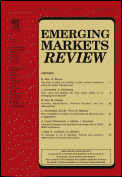
Emerging Markets Review
Empowering Voices in Business and EconomicsEmerging Markets Review, published by Elsevier, stands as a leading platform for scholarly discourse in the fields of Business, International Management, and Economics. With a strong focus on the dynamic and evolving landscapes of emerging markets, this journal boasts an impressive impact factor, reflecting its high-quality research and significant contribution to the academic community. Covering a wide array of topics pertinent to emerging economies, the journal is dedicated to disseminating cutting-edge research findings, theoretical advancements, and practical insights that are essential for both researchers and industry professionals. Operating since 2000, and with its converged years extending to 2024, Emerging Markets Review has secured a Q1 category ranking in both its primary domains (Business and International Management; Economics and Econometrics), underscoring its critical role in shaping knowledge and practices in these fields. The journal's esteemed reputation is further highlighted by its strong Scopus rankings, placing it among the top percentile for relevant subject areas. Although it is not an Open Access journal, it remains accessible through institutional subscriptions, ensuring that the wealth of knowledge contained within its pages reaches a broad audience.
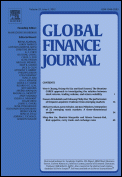
Global Finance Journal
Elevating discourse in finance and economics.Global Finance Journal is an esteemed periodical published by Elsevier, dedicated to the dynamic fields of finance and economics. With an impressive history spanning from 1989 to 2024, this journal holds a significant position in the academic community, boasting a Q1 quartile ranking in both Economics and Econometrics, as well as Finance, as of 2023. It is highly regarded in Scopus rankings, placing 40th out of 317 in Finance and 99th out of 716 in Economics and Econometrics, demonstrating its influence and reach among researchers and practitioners alike. Although not an open-access journal, the Global Finance Journal provides rigorous peer-reviewed articles that explore critical issues, advance theoretical frameworks, and address practical applications in global finance. As such, it serves as a vital resource for researchers, financial professionals, and students aiming to deepen their understanding of economic phenomena and contribute to the ongoing discourse in these vibrant disciplines.

Asia-Pacific Financial Markets
Elevating Financial Scholarship Across the Asia-PacificAsia-Pacific Financial Markets is a distinguished academic journal published by SPRINGER, dedicated to advancing the field of finance research in the Asia-Pacific region. With an ISSN of 1387-2834 and an E-ISSN of 1573-6946, this journal fosters scholarly discourse on contemporary financial markets, investment strategies, and economic policy implications. Situated within the Q3 category in Finance for 2023, it ranks #140 out of 317 in the Scopus database, reflecting its growing significance and impact within the financial research community, as evidenced by its 55th percentile ranking. Since its inception in 1996, the journal has served as a pivotal platform for researchers, professionals, and students alike, featuring rigorous empirical studies and theoretical frameworks that address emerging financial trends and challenges. While it operates under a subscription model, the journal's comprehensive scope and commitment to high academic standards make it an essential resource for anyone looking to deepen their understanding of finance in the dynamic Asia-Pacific landscape.

South Asian Journal of Business Studies
Illuminating the path for future business leaders and researchers.South Asian Journal of Business Studies, published by Emerald Group Publishing, is an esteemed academic journal that serves as a vital platform for researchers, professionals, and students in the fields of Business and International Management, Cultural Studies, Economics, Marketing, and Strategic Management. With an ISSN of 2398-628X and an E-ISSN of 2398-6298, the journal has made significant strides since its inception in 2017 and continues to converge until 2024. Notably, it boasts impressive Scopus rankings, including a remarkable Q1 classification in Cultural Studies and Economics, all while enjoying high impact factors that reflect its quality and relevance in academia—ranked in the 98th percentile in Cultural Studies and 89th in Economics, Econometrics, and Finance. Despite no open access option, the journal is committed to advancing knowledge and offering insights into dynamic business landscapes across South Asia. It stands as a crucial resource for those looking to understand the intricate interplay between regional business practices and global trends.

African Review of Economics and Finance-AREF
Fostering Knowledge Exchange on African FinanceAfrican Review of Economics and Finance (AREF) is a distinguished academic journal dedicated to advancing knowledge in the fields of economics and finance within the African context. Published by PORTHOLOGOS PRESS, the journal aims to provide a platform for research that addresses critical economic and financial issues that affect Africa, promoting innovative solutions and fostering discussion among scholars and practitioners. With its ISSN 2042-1478 and E-ISSN 2410-4906, AREF has established itself as a vital resource for researchers, professionals, and students seeking to deepen their understanding of African economies. The journal’s commitment to open access ensures that its valuable research findings are readily available to a global audience, thereby enhancing visibility and engagement. Through rigorous peer-review processes and thoughtful editorial leadership, AREF contributes significantly to the discourse on economic development, policy analysis, and financial practices in the region.

INTERNATIONAL ECONOMICS AND ECONOMIC POLICY
Connecting Theory and Practice in International EconomicsINTERNATIONAL ECONOMICS AND ECONOMIC POLICY, published by Springer Heidelberg, is a pivotal journal in the field of economics, focusing on both theoretical and empirical research that addresses pressing international economic issues. With an ISSN of 1612-4804 and an E-ISSN of 1612-4812, this journal has been a reliable source of insights since its inception and is poised for continuous growth, converging its themes from 2005 to 2024. Ranked in the Q2 category of Economics and Econometrics in 2023, it stands at a commendable 63rd percentile among similar journals, emphasizing its significance and impact in the academic community. Located in Heidelberg, Germany, the journal provides an access portal for researchers, professionals, and students to engage with cutting-edge economic analyses that inform policy and practice globally. By publishing original articles, reviews, and policy discussions, INTERNATIONAL ECONOMICS AND ECONOMIC POLICY plays a crucial role in shaping the discourse within the global economics landscape.
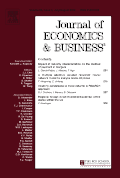
JOURNAL OF ECONOMICS AND BUSINESS
Advancing Knowledge in Economics and BusinessJOURNAL OF ECONOMICS AND BUSINESS, published by Elsevier Science Inc, stands as a leading platform for the dissemination of research in the fields of economics and business management. With an ISSN of 0148-6195, this journal is indexed in Scopus and boasts impressive rankings, including a position in the top 20% for both Finance and Economics and Econometrics. With a consistent publication history since 1978, it has become a vital resource for scholars and practitioners alike, providing insights into contemporary issues and emerging trends in the economic landscape. The journal, categorized in the Q2 quartile for both Business and Economics, invites rigorous research that advances theoretical and practical knowledge. While it operates under a subscription model, its notable impact factor reflects its significance and relevance in addressing critical questions within the business and economics domains. Whether you are a researcher, a business professional, or a student eager to deepen your understanding, the JOURNAL OF ECONOMICS AND BUSINESS is an essential resource for your academic and professional journey.

Journal of Economics Finance and Administrative Science
Exploring trends that shape economic landscapes.Journal of Economics Finance and Administrative Science, published by Emerald Group Publishing Ltd, is a premier open-access journal that has been at the forefront of advancing knowledge since its inception in 2012. With an ISSN of 2077-1886 and E-ISSN of 2218-0648, the journal caters to the disciplines of economics, finance, and administrative sciences within an international context, specifically observing trends from Peru and beyond. This highly regarded journal holds a Q1 ranking in Economics, Econometrics and Finance for 2023, landing it in the top percentile among its peers, with an impressive Scopus rank of #33 out of 288 in general economics. Since transitioning to open access in 2017, the journal has democratized access to cutting-edge research, making it indispensable for researchers, professionals, and students alike. By publishing rigorous empirical studies, comprehensive reviews, and innovative theoretical contributions, the Journal of Economics Finance and Administrative Science aims to facilitate knowledge exchange and foster collaboration within the global academic community.
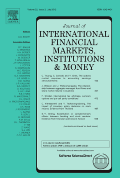
Journal of International Financial Markets Institutions & Money
Innovating Research in International FinanceThe Journal of International Financial Markets, Institutions & Money, published by Elsevier, serves as a leading platform for the dissemination of high-quality research in the fields of finance, economics, and econometrics. With an impressive impact factor reflected in its status as a Q1 journal in both categories for 2023, it ranks among the top journals, positioned at #47 out of 317 in Finance and #111 out of 716 in Economics. This journal offers a unique focus on the interplay between financial markets and institutions on a global scale, making it an essential resource for scholars, practitioners, and students alike. The journal welcomes innovative theoretical, empirical, and applied research, contributing to an exciting dialogue that shapes the future of international finance. For researchers looking to publish their findings, this journal is committed to rigorously engaging with contemporary financial phenomena, positioning itself as a vital cornerstone of academic and professional discourse.
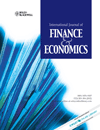
INTERNATIONAL JOURNAL OF FINANCE & ECONOMICS
Illuminating Pathways in Accounting and EconomicsInternational Journal of Finance & Economics, published by Wiley, is a premier academic journal that serves as a vital resource for researchers and professionals in the fields of finance, accounting, and economics. With an impressive impact factor and a reputation for excellence, the journal is recognized in the 2023 Scopus rankings, placing in the top quartiles across multiple categories, including Q2 in Accounting, Economics, and Finance. The journal has been a significant contributor to academic discourse since its inception in 1996, with its converged years extending to 2024, thereby ensuring the continuous advancement of knowledge in these critical areas. Although it operates under a traditional subscription model, its comprehensive articles provide insightful analyses, empirical research, and theoretical advancements that cater to a diverse audience—from seasoned scholars to emerging students in the field.